Breaking Bread: Crafted loaves on the rise at 5 local bakeries
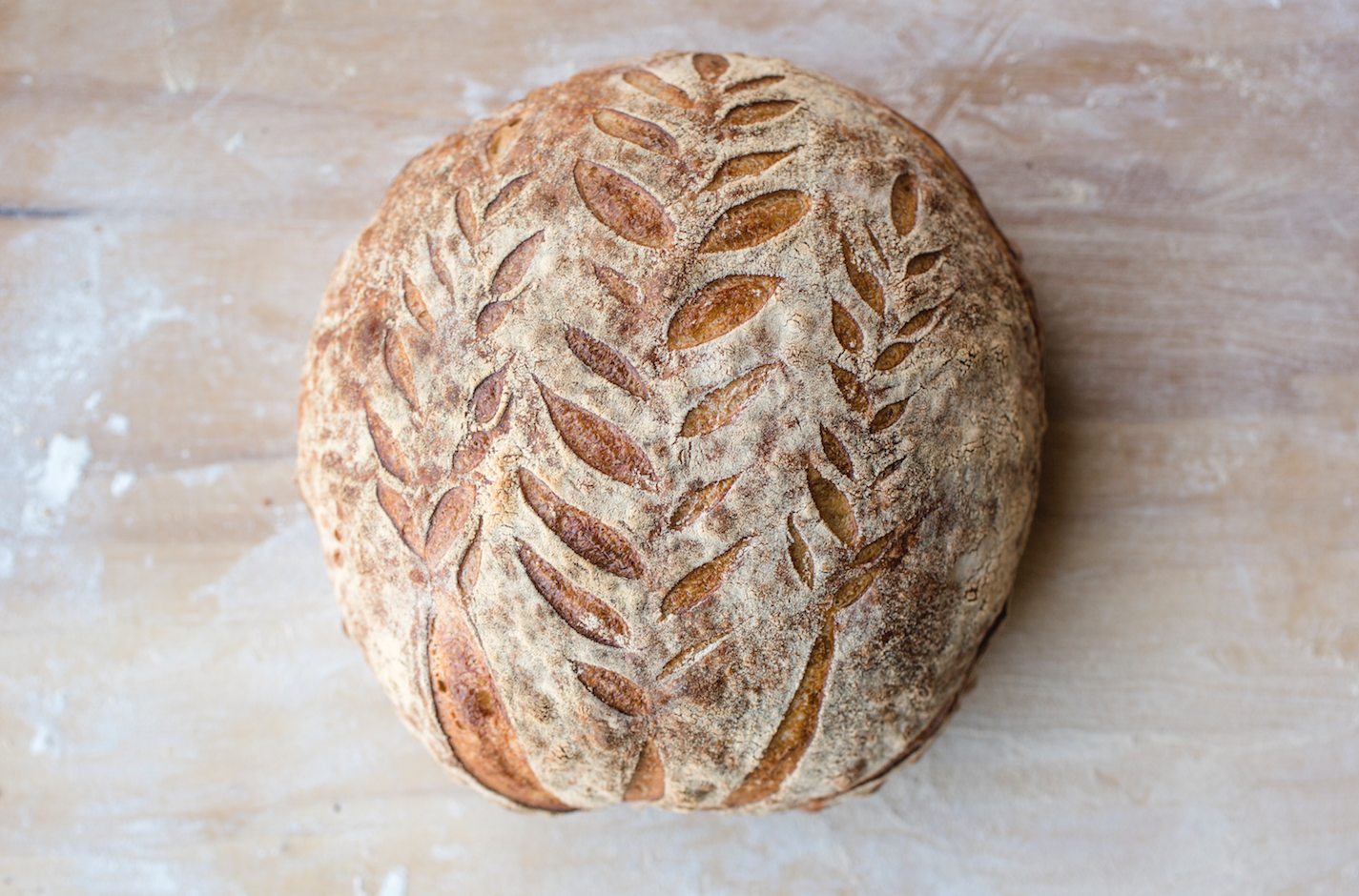
Like dough itself, one of the most compelling aspects of food is the way its meaning can be stretched and changed completely depending on the person you talk to. Or the country in which they live. Or whether or not they’ve eaten recently.
For some it’s about sustenance, and flavor, and fun. For some, even though it’s about sourdough bread, it’s about faith.
Dan the Baker | 1028 Ridge St.
While skittering around his production kitchen crafting several of nearly 1,000 country sourdough loaves he will make this week alone, Dan Riesenberger’s energy visibly changes when I ask him to talk about his sourdough bread. His face catches the light.
“It’s my meditation,” says Riesenberger, more commonly referred to as Dan the Baker. “It’s something that I believe in so viscerally, and that’s why it feels like it’s a part of me. I’m not a religious person at all, but making sourdough bread becomes a spiritual experience. It nurtures people. It nourishes people. It’s a beautiful thing.”
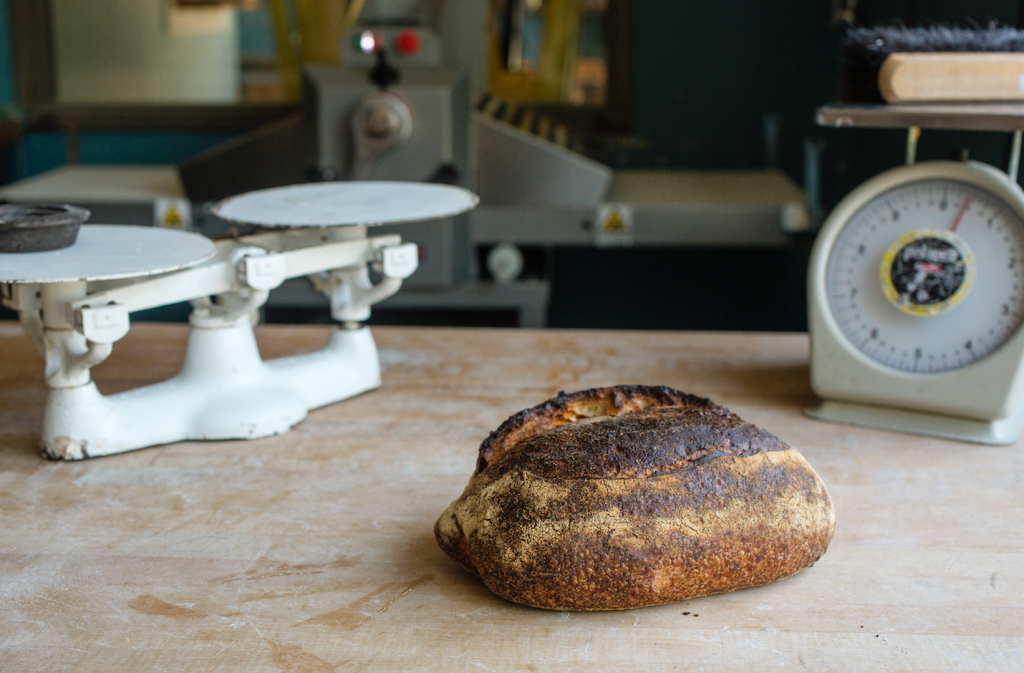
What sets these loaves apart, according to Riesenberger, are his ingredients. Utilizing cultured French butter to laminate his dough, along with fresh and local ingredients makes a world of difference.
His country sourdough loaves, the baker’s biggest seller, feature a surprisingly dark—almost black in some places—crust with a prominent score running across the top. This crust creates a wonderful contrast with the light bread inside that features a very open crumb structure and classic sourdough tang.
Flowers & Bread | 3870 N High St.
While Clintonville’s young bakery Flowers & Bread may lack some of the name recognition of Dan the Baker or Omega, this isn’t due to lack of quality from the North Side establishment. In fact, the eatery was recently recognized by USA Today as one of the top ten artisanal bakeries in North America, hoisting them up along the ranks of San Francisco’s explosively popular Tartine.
And for good reason. According to baker Felix O’Connor, the sourdough at Flowers & Bread is imbued with one particular ingredient that’s indispensable to any good bread: care.
Not only is the dough left to proof in their fridge for upwards of 20 hours (when the bread is started at 3:00 a.m. daily), a step critical to the development of that particular sourdough flavor, the bakery’s starter is looked after with the attention one might give to an infant.
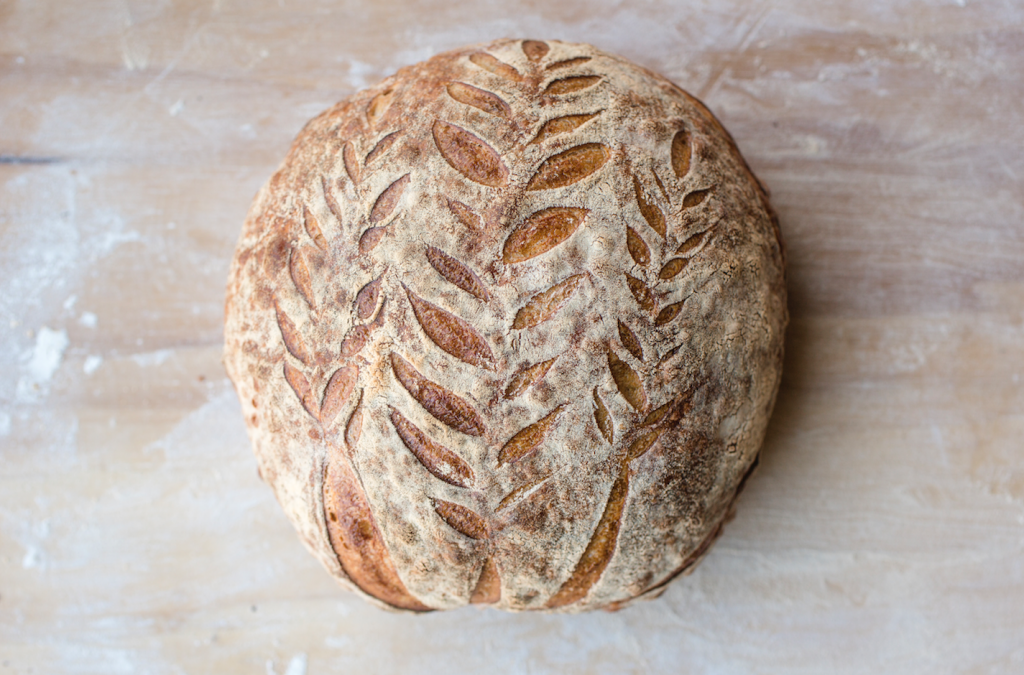
“We’re always taking care of our starter, we’re feeding daily, sometimes even every few hours. To do so, we mix the original starter with equal parts our and water,” says O’Connor. “It’s almost like a little pet.”
O’Connor’s bread is immediately visually distinct from others’ due to the presence of one small but pleasant addition, that of culinary art.
Using razors, the baking team at Flowers & Bread scored winding rows of ferns vertically into the bread, which featured a perfectly middle of the road, not too dark and not too light crust. Keeping with the sourdough standard, the loaf does see some larger holes, but keeps a tighter crumb structure than many loaves.
BROUGHT TO YOU BY
Omega Artisan Baking, North Market | 59 Spruce St.
While Riesenberger displays the youthful ambition and exuberance of a super-talented young artisan, Amy Lozier, the owner of Omega, comes off just as passionate, except her energy has settled into an equally impressive calm and confidence that only experience can afford.
Omega opened in the Columbus North Market in 2003, and since then, owner and head baker Lozier has been striking a delicate balance between staying true to her baking style (such as a wonderful rustic French loaf with a nearly blackened crust) while still making the loaves her customers love.
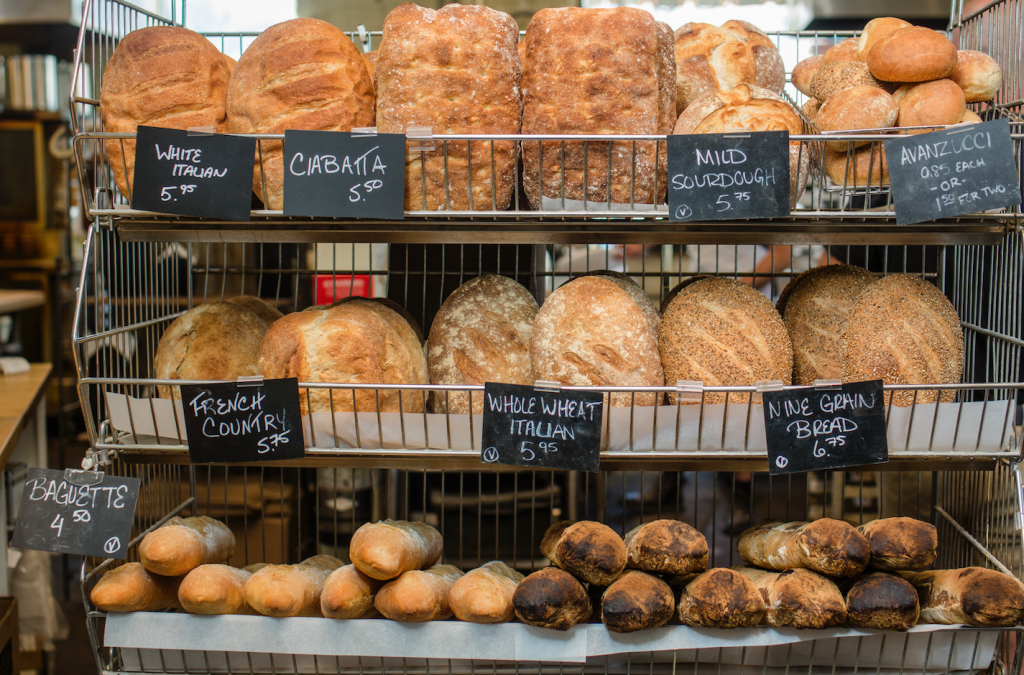
“When we first starting making it our sourdough looked a lot like Dan the Baker’s, with the harder crust and an open crumb structure,” says Lozier. “But our customers really wanted to use our sourdough for sandwiches, so we listened to them. It’s too hard to eat one with tuna falling through all those holes.”
After constant customer feedback, Omega listened, and began making a variant perfect for sandwiches from an English sourdough recipe, one that opts for a softer crust and a less intense sour tang (which comes from the presence of lactic and acetic acid in sourdough starters). Most important to Omega patrons though, the style creates a much finer, almost pillowy, texture in the bread, and a tighter crumb structure that doesn’t allow for noticeable holes.
Laughlin’s Bakery | 15 E 2nd Ave.
Jonas Laughlin could have been a professional singer, but now his symphonies come fresh out of the oven.
The owner of Laughlin’s bakery was training to become an opera singer, when unforeseen damage to his vocal cords caused him to end this career pursuit.
Instead, he followed another passion, one we’re all thankful for: baking. “At first, baking was therapeutic for me, and then it just became something more and more serious,” he says.
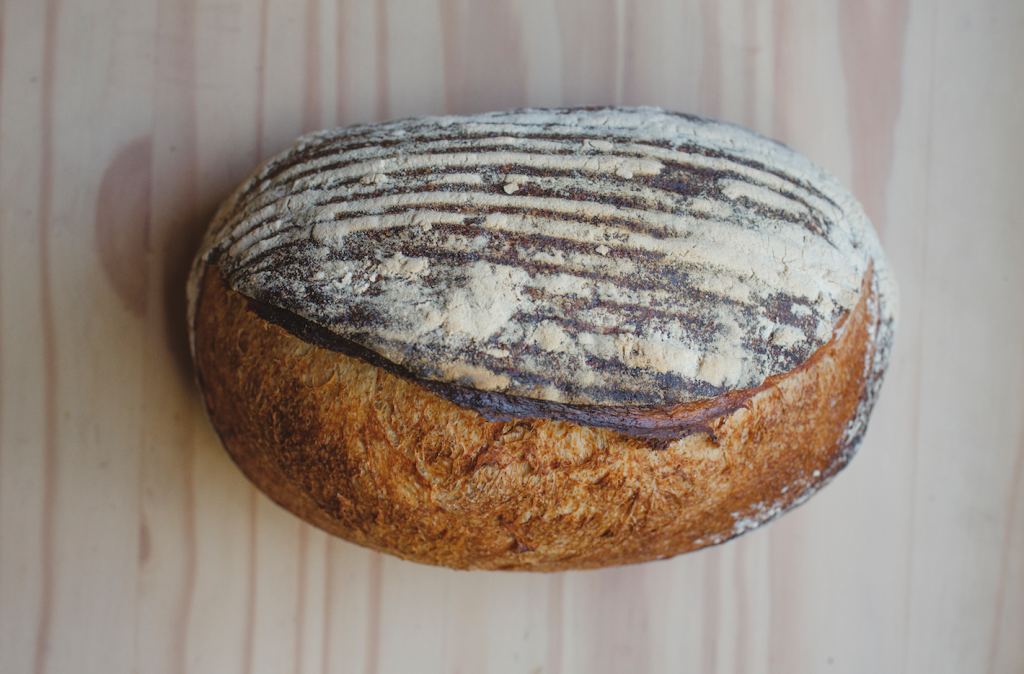
Laughlin’s is actually best known for its French baguette, a customer favorite combining a crispy exterior with an open, soft white bread that flies off the shelves. “This was actually a really big deal for us,” says Laughlin, noting that it took years to perfect the recipe.
In addition to his baguette, though, the bakery also offers what is likely the most unique sourdough on our fall list. The Italian Village establishment crafts a sourdough loaf with a beautifully dark exterior, riven with lighter scoring and one single, dramatic vertical slash.
But what makes this bread stand out the most is what’s inside. Featuring a small-to-medium-sized crumb structure with modest but clearly visible holes, the bread has a distinct tan. This is because it’s a whole wheat sourdough, something most bakeries don’t take on, but Laughlin felt the grains added a fullness and complexity to the sourdough’s flavor that pushed it in a new direction.
And it really does work. The firm crust imparts a satisfying crunch, but the grains are the star of the show. They’re present, but subtle, leaving a trace of rich, earthy, nuttiness with every bite.
Lucky Cat Bakery | 3825 Columbus Rd., Granville
I’m a dog person, but last Saturday morning at the Clintonville Farmer’s Market, I would have professed my love for cats, and it wouldn’t have been a lie.
For one cat in particular. The Lucky Cat.
The feline-christened bakery has been serving Granville for nearly a decade, and its sourdough batard is one of the standouts on its menu.
From the jump, Lucky Cat’s owner and baker Andrew Semler seems to be tapped into the science of bread making. “Our batard is fully mixed by hand, where some others use mixers,” said owner Andrew Semler. “When you use a mixer, air is incorporated. Not only will oxygen bleach the bread to an extent, it also removes some flavor from the our used as well.”
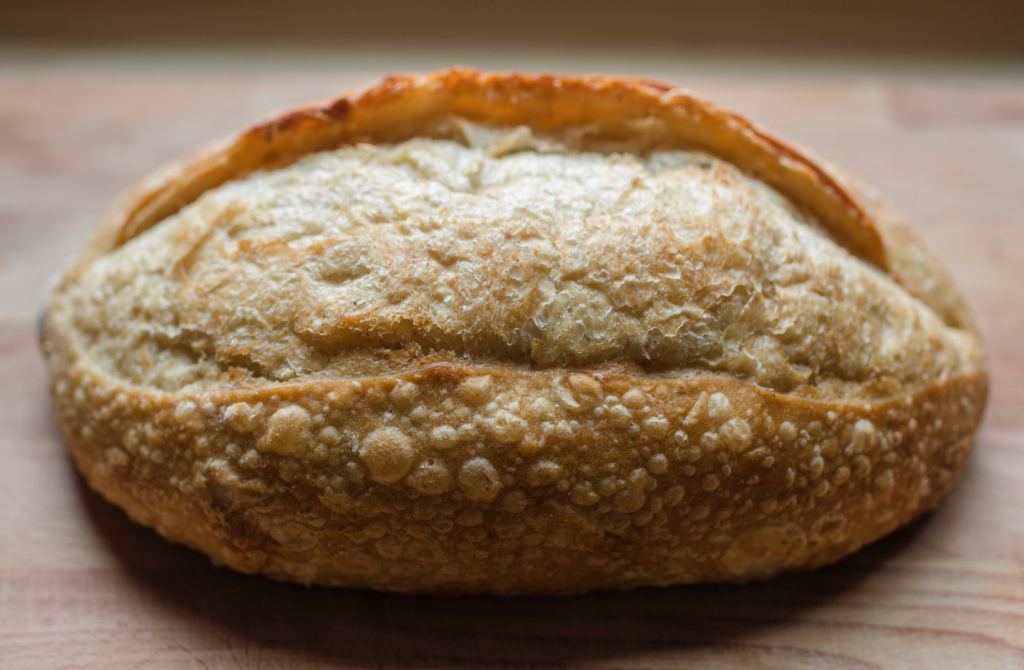
He goes on to note that Lucky Cat opts for a “stiffer” starter with their sourdough, meaning the dough will have less water content. In terms of flavor, a stiff starter will yield more acetic acid in the final product (versus a more liquid starter that creates more lactic acid). Every loaf of sourdough contains both types of bacteria and acid, but the acetic offers a bit more of that punchy, vinegar-like tang, whereas lactic acid produces a sourness akin to yogurt.
In addition to the acetic twang of the Lucky Cat’s batard, Semler deliberately shoots for a middle-of-the-road crumb structure and a lighter than average crust. This offers less crunch, but according to the baker, this makes the bread easier to reheat for toast and other culinary purposes, and fans of soft and supple bread will no doubt be pleased.
BROUGHT TO YOU BY




